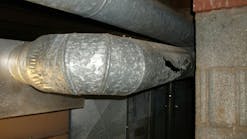by John Garofalo
Much has been written and said about what it takes to be a great service manager in our business, especially given all the changes our industry is facing. Probably one of the biggest impacts is the fact that service technicians today are expected to have excellent technical skills. Simply put, it's the price of admission. It no longer is the most important tool in their bag. They must become people fixers. We all have seen first-hand, or heard, the horror stories of a technician fixing the box, and then running afoul of the customer. If you don't fix the people, the box is irrelevant. What this means to the service sector of our business is that we can no longer promote the most technically astute serviceman to the role of service manager. The role is now becoming the service leader and that has nothing to do with knowing how to take the superheat or subcooling readings.
The person leading the service department of today's HVAC company knows that Leadership is not something we are born with. Rather, it's an observable and learnable set of practices and behaviors. As we say in the South, "you ain't born with it."
So what exactly is this leadership stuff?
Leadership is influence, nothing more, nothing less. It's learning how to hold oneself, and one's people accountable. Colin Powell said it this way; "It's the art of mobilizing others to want to struggle to achieve common aspirations."
Why is it a struggle? Another great leader and businessman, Jack Welch of GE fame, said "Your job is to fight the gravitational pull of negativism."
Negativity is all around us. Sometimes it's our people, sometimes it's the weather we fight constantly, and sometimes it's that little voice that haunts us all. Our people in the field face hot attics and cold basements, haul heavy equipment around, and mostly work alone. It's too easy to become negative.
When we study those observable habits and practices of great leaders, we begin to understand the recipe. What do winning service leaders do? They relentlessly upgrade their teams. I know getting technical people in our business is the hardest obstacle we face. That is why we must recruit constantly. Leaders make sure their people not only see the vision, they live and breathe it. Leaders infect everyone with positive energy and optimism. They have the courage to make those tough calls; they push, pull, probe; and are agents of change.
One of the hardest parts of being a leader of anything is encouraging your people to take risks. Most of us learn far more through our failures, than our successes. If this is true, shouldn't we encourage more failures? Scary thought, I know. Mr. Honda, of car fame, said if your manager's decision making batting averages are better than 40%, they're not making enough decisions. Another thing we leaders have trouble doing is finding cause to celebrate. We can find faults far too often. Can we find a reason to have a small parade?
Leaders Bring Strength
If you own your company, you must have already realized that the strength of any company/department is a direct result of the strength of the leaders. Not the followers. A real scary thought is, "you are what you reproduce." Are you a disciplined person? Before you answer that, realize that most people misunderstand this word. Discipline is not corporal punishment. It's defined as training that molds, corrects or perfects, control gained by obedience of training. A system of rules governing conduct. Driving to work the same way every morning is a discipline. Putting on the same shoes every morning is a discipline. Getting hit in the head with the shoes because your wife tripped over them each morning is corporal punishment. Leaving them in the middle of room is also a discipline — one you'd better fix.
What are some of the activities in which a 21st century service manager is involved? Establishing monthly goals for selling service agreements, averaging repair invoices, managing call backs, producing replacement leads, and all those issues dealing with caring for service vans. All these issues are tracked daily, weekly or monthly. Everyone on the team knows the score, especially the service leader. Why? With this real time data, the leader can determine where he should spend his time. He will know who needs what type of training. He will be able to perform (the dreaded words) performance reviews. The leaders of the service department must create a sense of urgency in their department.
Southwest Airlines has a unique perspective on hiring. Their motto is "Hire for Attitude, and Train for Skills." That doesn't mean they hire pilots with great attitudes but no flying skills, or aircraft mechanics who have great personalities but don't know a propeller from a jet engine.
Another reason we need a 21st century service leader is our customers. Today, their expectations are so much more than a few years ago. Why? We all know the answers. Today's customers are smarter, faster, more demanding, less tolerant, working more, earning more, and spending more.
Customer Demand
Here's a look at what a lot of customers told us they demanded from any serviceman coming into their home:
Reliability — the ability to provide what was promised dependably and accurately.
Can we DIRTFT (Do It Right The First Time)?
Assurance — the ability and courtesy of employees, and their ability to convey trust and confidence. They want to make sure they made the right choice.
Empathy — the degree of caring and individual attention proceed to the customer. They are asking, "Do you understand, and do you care?"
Responsiveness — the willingness to help customers and provide prompt service. They're asking, "can you help me, and promptly?"
Tangibles — the physical facilities, equipment, and the appearance of the personnel. How do your people look? Here is how the 21st century service leader's people look: they wear a photo ID badge, shoe covers (skid proof), latex gloves when touching the t/stat or grilles, and uniforms. They never go into a house with tobacco products on their person, and have fresh breath and clean hands. Their invoices are readable, logical, and value driven. The field people are good communicators as well.
Marketing & Advertising
Many of the 21st century service leaders are becoming involved in the fuzzy world of marketing & advertising as well — fuzzy because it's more art than science.
Yes there are rules to follow, but when it comes to creativity, it's as long as it's wide. Most advertising people are more interested in creativity than getting a return on investment. Here's an example:
We all remember the Taco Bell Chihuahua. However, you can't find one article about how many more tacos Taco Bell sold during the two years of the dog ad campaign. What you can find out is, what was the most popular dog sold during those two years; you guessed it, Chihuahuas.
Here's a thought to consider when you get ready to advertise: what difference does it make if the people in your town can whistle your tune, say your slogan, or tell you they like your commercials, if they don't call you for a service call or sales?
Most of our HVAC companies don't advertise for stockholder effect, or for shock effect. They advertise to make the phones ring. Most problems come from us trying to advertise to our own tastes. Being led by the "experts." Having no plan for M&A. But the single worst sin we commit is not having any tracking in place.
Every company needs to be able to answer these two questions before spending a dime in M&A:
Can you determine the cost of a lead, and the cost of a sale? If you can't, you're doomed to do one of two things: repeat a disaster because you wouldn't know about it; or perhaps worse, not repeat a success, for the same reason. It's my opinion that as important as it is to have M&A that makes the phone ring, it's as critically important to know how to track each dollar spent. Having a plan is important, and making sure you have a backup plan for that promo you hoped would produce, but doesn't.
Here are some questions to ask before spending advertising dollars:
• Who is your target?
• What is their problem?
• What are their anxieties?
• How long has he had this problem?
• What is your offer?
• What are the benefits to the customer for purchasing your services?
• Why should the customer care about your offer?
• How will you motivate this customer to act now?
• Do you need to utilize fear?
• What procedures do you want this customer to follow to act now?
• What will happen if the customer does not act now?
• What is your guarantee?
• Do you have testimonials that you can use?
• Do you have competition for this customer?
If you have answers to these questions, it's time to place the advertisement.
The 21st century service leader also has to understand that if we do all the things we should do correctly, we still need to have the assistance of our customer service representatives. After all, they're the first point of contact for many of our customers. We need to train them well. When that customer calls for the first time, the experience must be memorable and set the level of expectation for what is to follow at their home.
Speaking of training, this is where the 21st century service leader shines. They're the one who goes into the field to train technicians on how to sell service agreements, convert repair calls to replacement leads, and legitimately increase the average repair invoice. Yes, they can do some classroom training. But don't fool yourself into thinking that to become a pilot all you need is ground school. To learn to fly, your instructor first puts you in the plane and shows you how to do it. Training in the classroom only sets the stage for what will occur in the customer's home. By showing them how to do it, you'll eliminate the legitimate question normally asked by field people, "is it possible to do this?"
Lastly, 21st century service leaders are involved in the financials of their company. They know them, see them, work with them, and, most importantly, are comfortable with them. They understand the meaning of gross profit. They understand labor costs, and "windshield time." They're students of good dispatching, and hold their people accountable for providing fabled service.
John Garofalo is a partner in Callahan/Roach and Garofalo, Inc. (CRG), a national training and consulting firm focused primarily on the contracting industry. To contact him, call CRG at 800/462-8217 or e-mail [email protected]
This article is based on the Residential Contractors Forum which John presented at the 2006 Sheet Metal and Air Conditioning Contractors' National Association (SMACNA) annual convention in Phoenix. For additional information on SMACNA, or to register for this year's convention in Las Vegas, visit www.smacna.org








